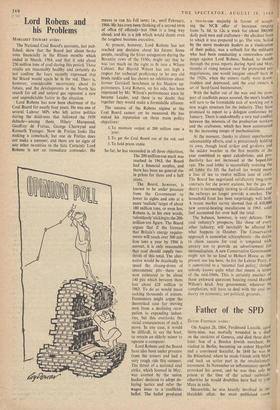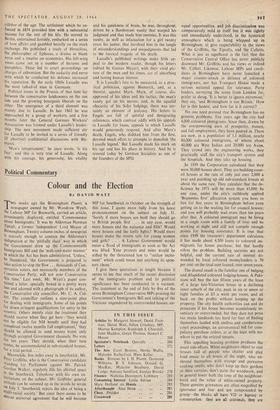Father of the SPD
DAVID FOOTMAN writes: On August 28, 1864, Ferdinand Lassalle, aged thirty-nine, was mortally wounded in a duel on the outskirts of Geneva, and died three daYs later. Son of a Breslau Jewish merchant, he studied in Berlin, becoming an ardent Hegelian and a convinced Socialist. In 1848 he was ill the Rhineland, where he made friends with Marx and took an active part in the revolutional'Y movement. In November an inflammatory speech provoked his arrest, and he was thus safe in prison at the time of the actual outbreak; otherwise he would doubtless have had to join Marx in exile.
Meanwhile, he was heavily involved in tile Hatzfeldt affair, the most publicised cause
cdlebre of the age. The settlement which he en- forced in 1854 provided him with a substantial Income for the rest of his life. He moved to Berlin, entertained lavishly, embarked on a series of love affairs and gambled heavily on the stock exchange. He published a study of Heraclitus, the philosopher of Ephesus, a drama in blank verse and a treatise on economics. His left-wing views came out in a number of lectures and Pamphlets. These led to court proceedings on charges of subversion. But the audacity and verve With which he conducted his defence increased his reputation. By the early 1860s Lassalle was the most talked-of man in Germany.
Political issues in the Prussia of that time lay between the conservative landowners on the one Side and the growing bourgeois liberals on the Other. The emergence of a third element was mainly due to Lassalle. In late 1862 he was approached by a group of workers, and a few months later the General German Workers' Association was formed under Lassalle's leader- ship. The new movement made sufficient stir for Lassalle to be invited to a series of friendly Of abortive) confidential discussions with Bis- ma rck 'Man's temperament,' he once wrote, 'is his 'ate': and this is very true of Lassalle. Along With his courage, his generosity, his vitality and his quickness of brain, he was, throughout, driven by a flamboyant vanity that warped his judgment and that made him enemies. It was this vanity, as well as infatuation for a girl twenty years his junior, that involved him in the tangle of misunderstandings and misjudgments that led to the farcical tragedy of his death.
Lassalle's published writings make little ap- peal to the modern reader, though his letters (edited by Gustav Mayer), with their vivid pic- ture of the man and his times, are of absorbing and lasting human interest.
It is Lassalle's fate to be measured, as a prac- tical politician, against Bismarck, and, as a theorist, against Marx. Marx, of course, dis- approved of his ideas and his tactics; the man's vanity got on his nerves; and, in the squalid obscurity of his Sobo lodgings, there was cer- tainly an element of jealousy. His letters to Engels are full of spiteful and denigrating references, which contrast oddly with his appeals to Lassalle for loans, appeals to which Lassalle would generously respond. And after Marx's death, Engels, who disliked him from the first, devoted much effort to attempts to demolish 'the Lassalle legend.' But Lassalle made his mark on his age and has his place in history. And he is revered today by German Socialists as one of the founders of the SPD.



































 Previous page
Previous page